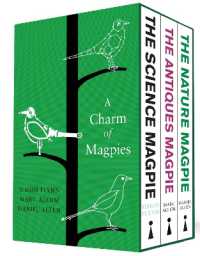- ホーム
- > 洋書
- > 英文書
- > Philosophy
Full Description
The question of whether aesthetic judgements are simply statements about subjective preferences or whether they have some non-subjective basis is one of the most important questions of aesthetics, and, indeed, of philosophy. In recent years, philosophers of language have discussed aesthetic judgements, but have assumed that aesthetic judgements are similar to judgements that employ predicates of personal taste such as 'tasty' and 'delicious.' A speaker's judgement that an item of food is tasty is a report about the speaker's subjective response to that item of food. If aesthetic judgements are like judgements that employ predicates of personal taste, to judge that the St. Matthew Passion is glorious is also a report about what some listener likes. If two people disagree about whether the St. Matthew Passion is glorious, neither has made a mistake. Philosophers of art have tended to disagree with this view. They have distinguished aesthetic predicates such as 'serene,' 'balanced,' and 'glorious' from predicates such as 'tasty.' On this view, the judgement that some artwork is serene or even that it is beautiful is a report about the work, not a report about how a person responds to the work. Aesthetic judgements are not just statements about personal preferences.
This volume brings together some of the leading contemporary philosophers of art and philosophers of language to debate the status of aesthetic judgements. Are they simply expressions of personal preference? Is there more basis for saying that a painting is beautiful or serene than there is for saying that a cake is tasty? Is disagreement about aesthetic judgements faultless or can someone be mistaken about the aesthetic value of an artwork?
Contents
James O. Young: Introduction
1: Louise McNally and Isidora Stojanovic: Aesthetic Adjectives
2: Dan López de Sa: Making Beautiful Truths
3: Dominic McIver Lopes: Disputing Taste
4: Tim Sundell: Aesthetic Negotiation
5: David Davies: The Semantics of Sibleyan Aesthetic Judgements
6: Berit Brogaard: A Framework for Aesthetic Expressions
7: Elisabeth Schellekens: Value Judgements and Standards of Normative Assessment
8: Michael J. Raven: Against the Semantic Orientation towards Aesthetic Judgements
9: Carl Matheson: We Really Shouldn't Be Having this Conversation: Rational Disengagement in Science and in Art






